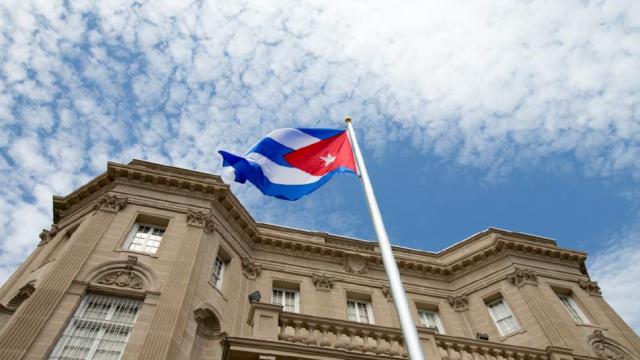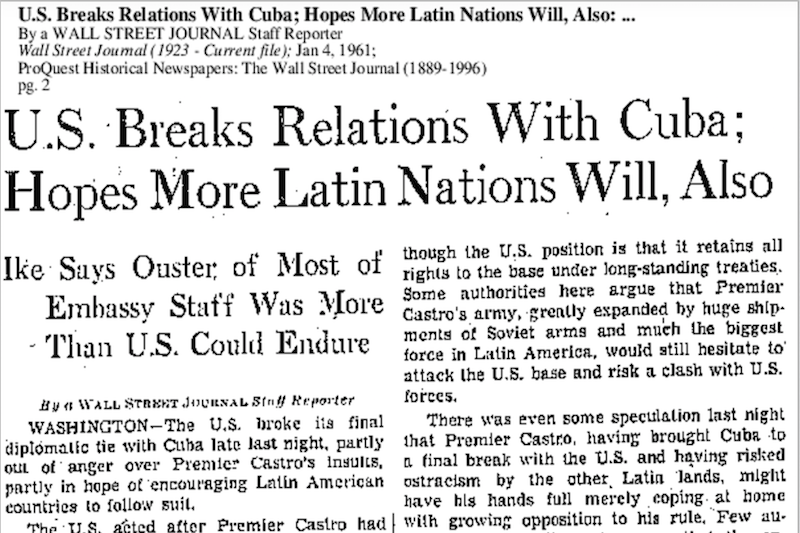
The Cuban flag was raised in front of the newly designated Cuban embassy in Washington, D.C., on Monday, a symbolic gesture that ushers in a new era between the United States and Cuba and formally re-establishes diplomatic ties ruptured more than 54 years ago.
Just past the stroke of midnight, the two countries reached a milestone in the historic thaw that began with a breakthrough announcement by U.S. President Barack Obama and Cuban President Raúl Castro on Dec. 17.
Foreign Minister Bruno Rodríguez on Monday morning presided over the raising of the Cuban flag over the colonial revival mansion that will again serve as Havana’s embassy in Washington. He was greeted by cheers and protests, including one man who appeared covered in red paint, symbolizing blood, The Hill reported. He was arrested.
Later in the day, Rodriguez and U.S. Secretary of State John Kerry held a joint press conference and hailed the reopening of the embassy, but they cautioned that there are still impediments to full normalization of relations.
"This milestone does not signify an end to differences that still separate our governments, but it does reflect the reality that the Cold War ended long ago and that the interests of both countries are better served by engagement rather than estrangement," Kerry said.
Rodriguez reiterated Cuban calls for the closure of Guantanamo Bay and the end of the trade embargo. He also raised the issue of U.S. criticism of Havana's human rights record, saying his government will not allow Washington to meddle. "We Cubans feel very happy with the way we Cubans manage our internal affairs," Rodriguez said.
Neither Kerry nor his Cuban counterpart went into specifics on human rights reforms.
While the Cubans hold their ceremony, the U.S. Embassy in Havana will also reopen. But no American flag will fly there until a visit by Kerry, which is expected next month. “We wanted the secretary to be there to oversee these important events,” a State Department official said.
Kerry and Rodríguez last met in April at the Summit of the Americas in Panama, where Obama and Castro also held talks. Aides see the outreach to Cuba as a boost to Obama’s legacy.
The re-establishment of embassies, agreed to on July 1, opens a new chapter of engagement by easing government contacts heavily constrained since President Dwight Eisenhower pulled the U.S. ambassador from Havana on Jan. 3, 1961. It was the culmination of diplomatic reprisals that began in the summer of 1960, when Fidel Castro began nationalizing U.S. property in the island.

“If we only had embassies in countries whose governments we agree with, we would have to close half of our current embassies,” Sen. Patrick Leahy, D-Vt., a longtime proponent of normalization, said Monday. “That is not why you have embassies. It is to protect the interests of the United States and of American citizens and to defend our ideals around the world.”
A full-service U.S. mission in Havana could offer some reassurance to companies interested in investing in Cuba after the Obama administration loosened a series of restrictions on U.S. business in January in an attempt to encourage the growth of the island’s small private sector.
It could also seed the way for more — although still heavily restricted — travel to the island by American citizens, who have been able to book rooms via Airbnb since April.
Talks to reopen the embassies dragged for months, with U.S. officials wrangling over a range of issues, including the size of diplomatic staffs in each country and the extent of freedom to travel they are granted.
While the opening of embassies marks a major milestone in the thaw between the U.S. and Cuba, significant issues remain. The two nations are also discussing possible cooperation on law enforcement, including the touchy topic of U.S. fugitives sheltering in Havana and restoration claims by Americans who lost at total of $1.9 billion in property in Cuba.
Reopening embassies is just the first step in what the Cuban government has called “a long and complex process toward normalization of bilateral ties.” Island leaders want an end to the 55-year-old U.S. embargo, the return of the U.S. naval base at Guantánamo Bay and a halt to U.S. radio and TV broadcasts aimed at the island.
Obama also wants Congress to repeal the economic embargo of Cuba, though he faces resistance from Republicans and some Democrats. Those opposed to normalizing relations with Cuba say he is prematurely rewarding a regime that engages in serious human rights abuses.
Since Jimmy Carter’s administration in the late 1970s, the United States and Cuba have operated diplomatic missions called interests sections in each other’s capitals. The missions were technically under the protection of Switzerland and did not enjoy the same status as embassies.
The Obama administration did not require congressional approval to reopen the U.S. embassy in Havana because it did not request money for an upgrade. However, any improvement to the embassy that requires funding would need the green light from Congress. The Republican-controlled Senate and House will also need to approve an ambassador to Cuba. That, like the lifting of the U.S. embargo, is unlikely to occur during Obama’s tenure.
3 WAYS TO SHOW YOUR SUPPORT
- Log in to post comments















